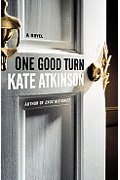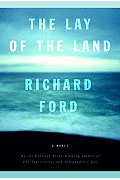
The Morning News Tournament of Books, sponsored by Powell’s Books, is an annual battle royale amongst the top novels in “literary fiction” published throughout the year. Read more about this year’s tournament »
» Buy the Books at Powells.com «
» Meet This Year’s Judges «
» Check the Bloggers’ Office Pool «
» Relive the Action: 2006, 2005 «
» Contact the Tournament Staff «
• ROUND TWO • MATCH THREE •
March 22, 2007
 |
One Good Turnby KATE ATKINSON |

|
| v. | ||
The Lay of the Landby RICHARD FORD |
judged by MAUD NEWTON
Vladimir Nabokov expressed contempt for the idea that fictional characters can influence their own destinies. “That trite little whimsy…is as old as the quills,” he told the Paris Review. “My characters are galley slaves.” No doubt Richard Ford intended an homage to Nabokov when he referred to his own characters as slaves some years back. (“Sometimes at night I hear them singing over in their cabins,” he said.) But Richard Ford is no Nabokov, and his narrator, Frank Bascombe, is no Humbert Humbert.
Bascombe, a “southern-raised frat boy,” is a transplant to New Jersey who’s getting on in years. As The Lay of the Land opens, his wife has just left him. His ailing prostate is filled with titanium BBs. His daughter, adrift on Harvard-educated ennui, has moved into his seaside home to help him battle cancer. Apart from these developments, Bascombe’s life is rolling along more or less as usual. He sells houses, lusts after his daughter’s girlfriend (who is “teeth-gnashingly beautiful,” unlike “your standard lesbian”), fantasizes about punching people, repeatedly congratulates himself for his good sense in voting for Gore rather than “idiot Bush,” and drives an SUV. Boy, does he ever drive that Chevy Suburban: up and down the turnpike, through every ethnic neighborhood in the vicinity, surveying the passersby as he goes. At one intersection stands a “shiny-legged Latina” whose “stiff little butt” faces oncoming traffic. A large man who steps out of a Cadillac is probably Italian, although his “spruced-up appearance” suggests he could be Greek, which “wouldn’t be better.” Here we have some “Chinamen.” There we have the academy where “even the Arab and Sri Lankan kids” are rich. And in the Northeast, in 1999, we have a multitude of “Negroes.” Generally these people serve as backdrop. Occasionally they are elevated to the level of plot devices: Caddy man really is Italian, a purveyor of manicotti, and possibly mobbed-up; a “giant, coffee-black Negro” throws a brick through the beloved SUV’s back windshield, enabling Bascombe to while away the evening in a lesbian bar with a “swamp-water coon-ass”-accented bartender while the glass is being replaced. To be fair, Bascombe’s Tibetan business advisor emerges as a more fully-developed character. Mike Mahoney—Lobsand Dhargey being “too much of a word sandwich” for Mike’s first American coworkers—is a talented businessman, although he most often serves in these pages as Frank’s chauffeur and potential doorway to Buddhism. He’s “easy to picture…in a magenta robe and sandals, sporting a yellow horn hat and blowing a ceremonial trumpet off the craggy side of Mount Qomolangma.” By the end of the book, Mike attains full co-broker status, having proved himself adept at selling houses to “beige-skinned” buyers and “monied subcontinentals.” “Generalities are my stock-in-trade,” Bascombe tells us. You don’t say. Richard Ford writes best when he focuses on men and women who may or may not still be in love. It’s a pity, then, that it takes more than 200 pages for his narrator to get around to telling us exactly why his wife ran off with her ex-husband, and how Bascombe feels in her absence. Until then he is neither a particularly sympathetic character nor sufficiently fascinating in his unpleasantness to warrant all the aimless tooling around in the car. Nabokov’s Humbert can drag Lolita up and down highways, into the beds of random hotel rooms, and his villainy is endlessly transfixing. Bascombe, on the other hand, is more like the windbag neighbor you dread running into at the curb while picking up your newspaper. Extending his own metaphor: Ford should’ve cracked the whip harder.• •
If The Lay of the Land suffers from its narrator’s wanderings and the relentless barrage of his musings, Kate Atkinson’s entertaining but forgettable One Good Turn has the opposite problem. Too often characters are shoehorned into the service of complex, but not quite convincing, plot twists.
A fender-bender involving a hitman and a real estate crime boss’s lackey brings together a single-mom cop, a bestselling hack novelist, the crime boss’s wife, and several other characters, including former private detective Jackson Brodie, who was also a central character in the acclaimed Case Histories.
Brodie has followed his long-distance girlfriend, Julia, to Edinburgh. There she tirelessly rehearses for a play he has no interest in seeing. Killing time around the city, Brodie blunders into the car accident, finds a dead girl washed up on the beach, and generally establishes himself as the prime suspect in a variety of suspicious situations the police are investigating. As he roams, he reflects on his girlfriend’s waning affections, wondering why she doesn’t want to marry him. Both Brodie and the police officer, Louise, are finely and sympathetically drawn. Despite troubles with her teenage son, Louise goes searching for the corpse Brodie claims to have found. She decides against turning him in for leaving a crime scene. Their attraction is palpable and unrealized, as they so often are in this sort of book, but never hackneyed.
Other characters are more clichéd. The pulp novelist never quite rings true, and many of the subordinate cast members—a gang of russian house-cleaning whores, a contract killer—seem like mere pawns. The climax of the novel is so contrived, I finally burst out laughing.
Still, Atkinson’s prose is evocative. And while One Good Turn is not as rich, true, or perceptive as the novels I gravitate toward, it held my interest. The book arrived while I was sick in bed with the flu, and I read it that day. The Lay of the Land, on the other hand, took 10 days to slog through. Ten days is not a problem, per se—I spent at least that long with Moby-Dick and Anna Karenina and Remembrance of Things Past—but two weeks after finishing Ford’s book, I still have no idea what the point of it was.
• About the Judge •
• From the Booth •
| Judge Newton almost convinced me that I didn’t actually like the book. | Kevin | John | We’re supposed to be professional wise-crackers here and we’re getting all existential and shit. |
» Read Kevin Guilfoile & John Warner’s commentary on the match «

» DOWNLOAD THE BRACKETS «
• Round One •
Half of a Yellow Sun v. Absurdistan
judged by Brady Udall
The Echo Maker v. The Emperor’s Children
judged by Marcus Sakey
Firmin v. Brookland
judged by Sarah Hepola
The Second Coming of Mavala Shikongo v. The Road
judged by Maria Schneider
Arthur and George v. One Good Turn
judged by Kate Schlegel
The Lay of the Land v. English, August
judged by Colin Meloy
Alentejo Blue v. Apex Hides the Hurt
judged by Dan Chaon
Against the Day v. Pride of Baghdad
judged by Anthony Doerr
• Round Two •
Half of a Yellow Sun v. The Emperor’s Children
judged by Jessa Crispin
Firmin v. The Road
judged by Mark Sarvas
One Good Turn v. The Lay of the Land
judged by Maud Newton
Alentejo Blue v. Against the Day
judged by Sam Lipsyte
• SEMIFINALS •
Half of a Yellow Sun v. The Road
judged by Elizabeth Gaffney
One Good Turn v. Against the Day
judged by Sasha Frere-Jones
• ZOMBIE ROUND •
The Road v. Against the Day
judged by Andrew Womack
One Good Turn v. Absurdistan
judged by Rosecrans Baldwin

